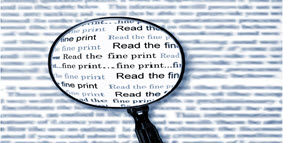
Read the fine print
They say knowledge is power, and that is true with your finances, too. To ensure that you get a fresh financial start for 2021, we want to remind you to read the financial disclosures and statements provided with your banking services, so you know what is available to you, what fees may be associated with your accounts, and what your benefits are. It is a good idea to pull your free annual credit report (if you have not recently) to make sure the information is accurate. Also, you should search for any forgotten or unclaimed funds you might have.
What are bank financial disclosures?
Federal and state laws require banks to provide documents to consumers about account and loan offerings. These documents, called disclosures, contain important information about the terms, fees, and interest rates applicable to your accounts. While some of the disclosures are lengthy, it is important that you read and understand them.
If you don’t have a copy of the disclosures discussed below, contact your financial institution. Let’s look at some of the disclosures that are important to review.
Deposit disclosures
Your deposit account disclosure, also known as a truth in savings disclosure, was given to you when you opened your checking and/or savings account. It tells you about the annual percentage yield (APY), interest rates, minimum-balance requirements, account-opening information, and fees. You may receive additional disclosures about your deposit account upon request, if certain terms of the account change, or if your bank sends a periodic statement. A review of these disclosures now will allow you to better understand your account terms. You can find more information about deposit accounts and disclosures at FDIC Consumer News: What You Need to Know About Billing Issues.
Loan disclosures
For your loans and credit cards, you will have received a truth in lending disclosure. It will tell you about the annual percentage rate or APR (the cost of credit expressed as a yearly rate as a percentage), the finance charge (the cost of credit, including interest and certain fees, expressed as a dollar amount), the amount financed (the dollar amount of credit provided to you); and the total of payments (the sum of all the payments that you will have made at the end of the loan). The disclosures for a mortgage loan will include additional information, including whether or not you have a prepayment penalty.
Privacy disclosures
Another disclosure you will want to review is your bank’s privacy disclosure. This document will tell you with whom your bank can share your financial information and for what purpose. It will also tell you whether or not you can opt-out of any sharing, and if you can opt-out, how to do so. For more information about your privacy disclosure, visit FDIC’s Consumer News: Would You Like Some Financial Privacy?.
Review your statements on a regular basis
A review of your bank statements is also a good place to go to help you get a fresh start in the New Year. A look at past statements can help you check your spending habits, plan your budget for the New Year, and avoid future fees.
Your credit card statements can also provide a place to establish a fresh start. Like your bank statement, reviewing your credit card statement allows you to look at your past spending and build a budget for 2021.
Order your free annual credit report
An easy way to get a jump on the New Year is to order your free annual credit report. Check to make sure all of the information on your credit report is accurate and complete. Check for the inquiries for companies you don’t recognize; report to the credit reporting agency if you see anything suspicious.
Credit agencies are required to provide you with a free report once a year, upon request. The big three agencies are Equifax, Experian and TransUnion. You might want to check a different one every four months to spread it throughout the year, say January, May and September. If you do so, remember the order for the proceeding years.
Search for lost or forgotten money
Have you moved and maybe forgotten money in a deposit account? If so, you may have unclaimed funds. Unclaimed funds are property or accounts where no activity has occurred as defined under state law. So if, for instance, your grandmother opened a savings account for you and you forgot about it, it is not lost. The good news is that you can search for any unclaimed funds that might be in your name. To see if you have any unclaimed funds, visit FDIC's Unclaimed Funds.
Starting your new year in the know by reading your financial disclosures is a positive way to kick off 2021. By reviewing your financial disclosures, analyzing your bank and credit card statements, examining your credit report, and searching for unclaimed funds, you will put yourself on a better financial path.
Additional resources:
Federal Trade Commission (FTC), Free Credit Reports
Consumer Financial Protection Bureau (CFPB), What is a Truth in Lending Disclosure?
National Credit Union Administration (NCUA), Why Reading Account Disclosures is Important
For more consumer resources, visit FDIC.gov, or go to the FDIC Knowledge Center. You can also call the FDIC toll-free at 1-877-ASK-FDIC (1-877-275-3342). Please send your story ideas or comments to ConsumerNews@fdic.gov. You can subscribe to this and other free FDIC publications to keep informed!
